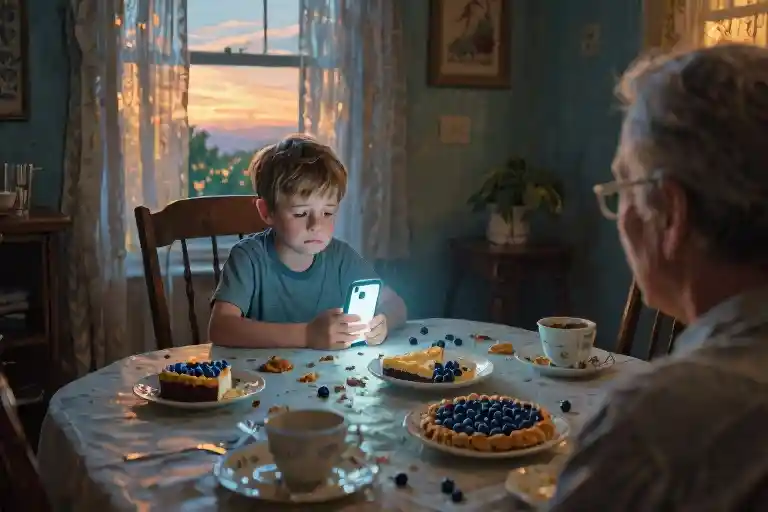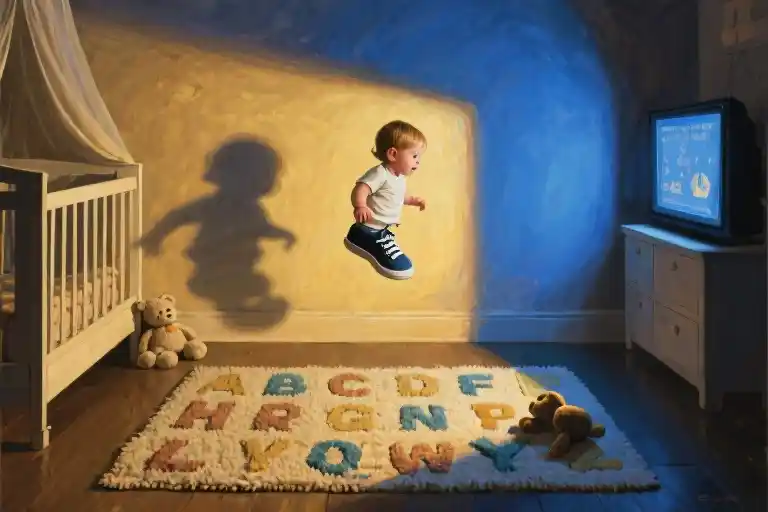The knife hovered mid-air as my mother’s hand suddenly covered mine on the chopping board. “That’s not how you hold it,” she said, her voice sharp like the blade she was criticizing. I froze, a half-sliced carrot rolling away from us. For five years I’d been cutting vegetables this exact way—my self-taught method that somehow produced edible, even complimented meals for our family.
“But you never showed me how,” I heard myself say, the words slipping out before I could measure them. That sentence hung between us, heavier than any kitchen utensil. It wasn’t about culinary techniques anymore; it was about all the unwritten manuals of adulthood I’d pieced together through trial and error while growing up in a home where academic textbooks outnumbered cookbooks.
Our kitchen confrontation revealed the peculiar paradox of my upbringing—the daughter of farmers raised like porcelain in a glass cabinet. My parents’ weathered hands planted rice seedlings by day, then shooed us away from household chores by night, believing any minute not spent studying would condemn us to repeat their backbreaking labor. They gave us the paradoxical gift of being overprotected yet underprepared, wrapping our childhood in academic pressure while leaving life skills to chance discovery.
That afternoon, as I watched my mother demonstrate her “correct” chopping technique—wrist angled precisely, fingers curled safely—I realized how many fundamental lessons exist in this silent curriculum of daily living. The classroom had taught me calculus and classical literature, but adulthood demanded knowledge of more mundane alchemy: how to transform raw ingredients into meals, convert paychecks into savings, turn conflicts into conversations.
Perhaps what stung most wasn’t the criticism itself, but the delayed awareness that while my parents sacrificed to give me an education, some essential teachings had fallen through the cracks between textbook pages. The irony? Their very desire to spare me hardship had created different challenges—the kind no formal education could remedy, the sort solved only by hands-on experience and sometimes, by burnt dishes or botched budgets.
Our kitchen standoff ended without resolution, the tension dissipating into the steam of boiling soup. But the question lingered like the scent of ginger in the air: When does protection become limitation? And how do we forgive these gaps in our upbringing while still acknowledging their impact? That afternoon, between slices of unevenly cut carrots, I began understanding that education isn’t just about the lessons we’re given—it’s equally about recognizing the ones we must give ourselves.
(Note: This opening section establishes the core conflict using sensory kitchen details while introducing key themes—generational parenting styles, life skills gaps, and self-directed learning. It avoids direct accusations while allowing space for the complexity of parental intentions. The narrative voice remains personal yet reflective, suitable for the target audience navigating similar family dynamics.)
The Self-Taught Survival Guide
The knife felt awkward in my hand that first time – too heavy at the blade end, the handle slippery with nervous sweat. I was seventeen, standing in our farmhouse kitchen with a pile of unevenly chopped carrots that looked more like abstract art than dinner ingredients. My parents were out tending the fields, and I had exactly one reference point for how this was supposed to work: the quick, rhythmic motions of the restaurant cooks I’d glimpsed through steamy diner windows during rare town visits.
For months, I practiced what I called ‘air knife skills’ – mimicking those observed wrist flicks with a pencil during study breaks. When actual vegetables finally met blade, I developed my own safety system: fingers curled like turtle shells, the knife moving in short, controlled strokes rather than the elegant sweeps professionals used. It wasn’t pretty, but it worked. The carrots cooked evenly, no band-aids were required, and that became my baseline.
Five years later, that self-developed technique became the unlikely star at a family reunion. My aunt, known for her exacting culinary standards, actually complimented the uniform thinness of my cucumber slices in the salad. “However you’re doing it,” she said through a mouthful, “keep doing it.” My mother remained silent, but I caught her studying my hands later as I julienned bell peppers with what I now realize was my version of muscle memory – efficient if unorthodox.
This became my pattern with countless life skills: observational learning followed by trial-and-error refinement. I could deconstruct the physics of bicycle riding from library books before ever touching a pedal, but no text prepared me for the visceral terror of that first wobbly descent down our dirt road. YouTube tutorials taught me to sew buttons years after classmates had mastered it under maternal guidance. There’s a particular loneliness to self-education that no one mentions – the constant low-grade uncertainty of whether you’re doing it “right,” whatever that means.
Yet this scavenger-hunt approach to adulthood yielded unexpected advantages. My knife skills, born from necessity rather than tradition, became surprisingly adaptable. When a friend gifted me a Japanese santoku knife with its unfamiliar balance, I adjusted within minutes while she struggled to abandon her mother’s strictly enforced “German knife only” rule. Being untethered from any single “correct” method meant I could absorb techniques from multiple sources without cognitive dissonance.
The real test came during my first apartment dinner party, where my hodgepodge culinary education faced its toughest critics: my roommate’s food blogger cousin and his chef boyfriend. As I prepped ingredients using my hybrid technique – part diner observation, part cookbook diagrams, part pure instinct – I braced for intervention. Instead, the chef leaned in with genuine curiosity. “That’s an interesting angle for chiffonade,” he noted, not critically but as one professional acknowledging another’s process. In that moment, the years of secret practice transformed from shameful deficiency to hard-won expertise.
Perhaps this is the hidden gift of being self-taught – the permission to create your own benchmarks. When no one establishes the “right” way, every solution becomes valid if it works. My cuts may never win precision competitions, but they’ve fed people I love without poisoning anyone, which seems as good a standard as any. The kitchen, I’ve learned, forgives almost any method if the hands are willing and the heart is in it.
The Invisible Rules We Missed
My cousin’s hands moved with practiced ease as she packed cabbage leaves into ceramic jars, each layer sprinkled with chili flakes and salted just so. ‘Mom showed me how to press them down with a stone weight,’ she explained, wiping her forehead with the back of her wrist. Watching her perform this ancestral kitchen ritual at seventeen, I suddenly understood what had been missing from my education.
While my peers received these casual apprenticeships—measuring rice water ratios by feel, testing noodle doneness against refrigerator magnets—I’d been given a different curriculum. My textbooks had diagrams of mitochondria but no instructions for distinguishing ripe avocados. I could recite chemical formulas faster than I could list the steps to descale a fish.
The great irony revealed itself during my first solo attempt at instant noodles. The boiling water evaporated unnoticed as I struggled with the stove dials, resulting in a blackened pot that smelled like burned plastic and wounded pride. My family found it hilarious. ‘All those math trophies can’t cook dinner,’ my uncle chuckled, unaware he’d named the central dilemma of my upbringing.
This skills gap manifested in subtler ways too. College roommates exchanged knowing glances when I stared blankly at a sewing kit. Colleagues paused mid-conversation about ‘marinating times’ as I pretended to understand. The unspoken household rules everyone else seemed to know—when to bleach whites, how to unclog drains without flooding bathrooms—formed a parallel syllabus I hadn’t been enrolled in.
What stung most wasn’t the ignorance itself, but the realization that these lessons were meant to be passed down casually, almost invisibly. The way my cousin absorbed kimchi-making between homework assignments, or how my roommate could chiffonade basil because she’d stood on a step stool beside her mother at age six. These weren’t formal teachings, but the quiet inheritance of daily living.
Now when I visit homes where teenagers casually whip up pancakes or patch bicycle tires, I recognize the quiet confidence that comes from hands-on mentorship. There’s a particular ease in their movements, an unselfconscious competence that no YouTube tutorial can replicate. It’s the difference between memorizing theory and developing muscle memory, between being told and being shown.
My kitchen mishaps have become fewer over time, though I still approach certain tasks with the cautious intensity of a lab experiment. What’s harder to shake is the lingering sense of having missed some fundamental initiation—like showing up to a potluck having only studied the recipe cards, never the cooking.
When Protection Becomes a Barrier
The wooden ruler tapped against my math textbook as my father delivered his favorite maxim: “Hands that hold brooms can’t hold pens properly.” At twelve, I accepted this as divine truth, watching my classmates sweep classrooms while my sister and I were whisked away for extra tutoring sessions. Our parents had drawn an invisible boundary around us – anything unrelated to textbooks existed beyond the fence of acceptable activities.
This carefully constructed bubble burst during my freshman week at university. My roommate stared open-mouthed as I stood paralyzed before the industrial washing machine in our dorm basement. “You mean… you’ve never done laundry?” she asked, her voice caught between disbelief and pity. The humming machine suddenly seemed as intimidating as a spaceship control panel. That moment crystallized the paradox of our upbringing – we’d been armored with provincial academic accolades but sent into adulthood without the most basic life skills.
Looking back, the warning signs had been there. My mother would shoo us out of the kitchen with the urgency of someone preventing a nuclear disaster. “Go study,” she’d insist, “I can chop vegetables faster alone.” What began as practical consideration gradually hardened into doctrine. By high school, we’d internalized the hierarchy – algebra problems deserved our full attention, while domestic tasks were distractions threatening to derail our academic trajectories.
This educational philosophy created curious gaps in our competence. I could recite chemical formulas but couldn’t boil an egg without supervision. My sister aced geography exams yet needed Google Maps to navigate three blocks from our apartment. We became walking contradictions – theoretically overqualified, practically helpless.
The consequences extended beyond domestic awkwardness. During my first internship, colleagues exchanged amused glances when I struggled with the office coffee machine. “Rich kid problems,” someone muttered, unaware that my parents counted every yuan saved on school supplies. The label stung precisely because it was inaccurate – we’d been raised with upper-middle-class expectations despite our working-class reality.
This protective barrier affected more than just practical abilities. Never being trusted with household responsibilities left me strangely hesitant to take initiative in other areas. If my parents didn’t believe I could handle folding laundry, how could I trust myself with career decisions or financial planning? The unintended message of our upbringing became clear: you’re only competent within these narrowly defined academic parameters.
Years later, I recognize the tragic irony. My parents sacrificed immensely to give us opportunities they never had, only to handicap us in unexpected ways. Their version of protection – meant to shield us from their struggles – inadvertently deprived us of the resilience that comes from overcoming small, everyday challenges. The very barriers erected to ensure our success became obstacles we’re still learning to navigate as adults.
Mending the Gap Without Blame
The kitchen smelled of ginger and unfinished conversations when I finally asked my mother the question that had been simmering for years: “Would you show me how you want me to cut these vegetables?” Her knife paused mid-air, its stainless steel surface catching the afternoon light like a silent movie frame.
What followed wasn’t the cooking tutorial I’d imagined. We discovered something more valuable – a new language for our generational communication gap. She demonstrated her “correct” chopping technique (turns out it was more about wrist angles than speed), while I explained why the self-taught method worked for my left-handed grip. The onions we diced that day carried fewer tears than our previous arguments.
Our reconciliation took an unexpected turn when we signed up for a weekend cooking workshop advertised as “mother-daughter knife skills.” The Japanese instructor’s approach to teaching basic life skills revealed how cultural perspectives shape domestic education. While my mom focused on precision cuts for presentation, I gravitated toward efficiency hacks for quick weeknight meals. Both valid, just different.
Three lessons emerged from our culinary détente:
- The retroactive teaching method: When parents critique, treat it as a delayed lesson rather than unfair judgment. “You’re holding the peeler backward” translates to “Here’s how I wish I’d shown you at twelve.”
- The skill exchange program: I taught my mom to use spreadsheet shortcuts while she explained laundry symbols. This reciprocal learning eased the “why didn’t you teach me” resentment on both sides.
- The generational translator: We found common ground by watching cooking competition shows together, analyzing contestants’ techniques like sports commentators. The neutral territory made critique feel collaborative rather than confrontational.
Our kitchen ceasefire didn’t resolve every parenting conflict (she still thinks my generation overdramatizes mental health), but it created space for practical reconciliation. Sometimes mending the life skills gap starts with something as simple as admitting: “I don’t know how to teach this properly” and “I need help learning.”
The real breakthrough came when my mother confessed she’d never been formally taught these skills either – she’d pieced together knowledge from watching neighbors and surviving mistakes. Her criticism stemmed from wanting to spare me the trial-and-error she endured. This vulnerable admission did more for our relationship than any perfectly julienned carrot ever could.
Now when we cook together, there’s an unspoken rule: corrections must come with demonstrations, and new techniques get tested by both parties. Our latest compromise? She uses my time-saving rough chops for stir-fries, I adopt her presentation cuts for dinner parties. The vegetables taste the same, but the process feels nourishing in ways that transcend the meal itself.
The Missing Manual: Life Skills Your Parents Never Taught You
That kitchen confrontation with my mother revealed something deeper than diced carrots – it exposed the invisible curriculum of practical knowledge that many of us had to piece together alone. While our parents focused on academic success, they often overlooked teaching the fundamental life skills we’d need as independent adults.
Your Turn: What’s On Your Missing Skills List?
We all have those moments of realization – standing clueless in a grocery aisle trying to pick ripe produce, or staring at a washing machine’s settings like it’s alien technology. These gaps in our practical education become particularly noticeable when we:
- Move into our first apartment
- Start cooking for ourselves regularly
- Face basic home repairs
- Manage personal finances independently
I’d love to hear what made your personal “Why didn’t anyone teach me this?” list. Was it:
- Basic sewing repairs
- Understanding health insurance
- Car maintenance essentials
- Proper cleaning techniques
- Time management strategies
Sharing these experiences helps normalize the learning curve many of us face in adulthood. There’s no shame in these gaps – only in pretending they don’t exist.
Building Your Adulting Toolkit: 3 Starter Resources
For those playing catch-up on practical life skills, these YouTube channels offer judgment-free guidance for adult beginners:
- Dad, How Do I? – The internet’s favorite surrogate father figure explains everything from shaving to changing tires with patient, step-by-step demonstrations.
- Pro Home Cooks – Cooking fundamentals broken down without chef-level pretension. Their knife skills playlist could have saved me years of awkward vegetable massacres.
- Clean My Space – Cleaning techniques that actually work, presented by someone who understands not everyone grew up with a chore routine.
What makes these resources particularly valuable is their understanding that adult learners need:
- Clear explanations without assumed prior knowledge
- Realistic time commitments (no 4-hour beef Wellington tutorials)
- Affordable equipment alternatives
- Permission to make mistakes
The beautiful irony? Many parents who didn’t teach these skills often appreciate when we share these modern learning resources with them. My mother now asks me to send her cooking tutorials she finds “helpful for beginners” – a quiet acknowledgment that education flows both ways across generations.
As we fill these gaps in our practical knowledge, we’re not just acquiring skills – we’re rewriting the narrative about what constitutes a complete education. And perhaps preparing to teach our own children (or parents) something new along the way.





